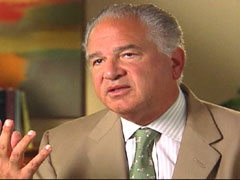In This Episode << SLIDE LEFT TO SEE ADDITIONAL SEGMENTS
Personalized Genetic Testing
SAUL GONZALEZ, correspondent: Unlocking and interpreting the secrets hidden in DNA used to be the province of scientists and medical researchers. But now it’s a growing business, one that’s selling genetic information directly to American consumers, making a DNA test as easy to buy as housewares or clothing.
JACK LORD (CEO, Navigenics): You know, I think for the history of man people have always wanted to see something about their future, and now, through the power of genetics and genomics, we are able to look into the future in a science-based way.
GONZALEZ: Jack Lord is the CEO of Navigenics. It’s a California-based company that for a fee of $999 offers its clients a personalized DNA test, one that pinpoints genetic markers indicating possible future threats to their health.
 Jack Lord |
JACK LORD: It’s really simple. It’s some saliva that we collect. We analyze that and then give you a report that shows what your risks are compared to people in the population at large. So today we test for 28 conditions, and they range from chronic conditions like diabetes or heart disease, to cancers like melanoma or prostate cancer or breast cancer, to other conditions that are generally silent diseases like glaucoma and macular degeneration, celiac disease, to Alzheimer’s disease.
GONZALEZ: Navigenics is one of a growing number of new companies selling genetic tests directly to the public. All of them promise their clients better health and a better life by getting up close and personal with their DNA.
MIKE GODFREY (Navigenics Client): Once you log into the Navigenics site, you get a snapshot page here that just really outlines in these square boxes what you are at a high risk for, what you are at average risk for, and what you are at lower than average risk for.
GONZALEZ: Mike Godfrey, who works in corporate communications for a hospital in San Diego, is a Navigenics client. When he first got his DNA results back, Godfrey was surprised by his relative risk for several illnesses when compared to the rest of the population.
GONZALEZ (speaking to Mike Godfrey): …diabetes, Alzheimer’s disease, heart attack, brain aneurysm, obesity….
MIKE GODFREY: …atrial fibrillation, obesity…
GONZALEZ: That would seem to be a lot to be worried about.
MIKE GODFREY: …Graves disease, which I never even heard of before. So to be honest, in my initial reflection when I looked at this, I went whoa!
 Mike Godfrey |
Personal trainer to Mike Godfrey: One more. That’s all you need. Just one more.
GONZALEZ: Although he says he’s not overly concerned, Godfrey’s DNA test results have spurred him to think more about his health and spend a lot more time at the gym.
GODFREY: When you look through all of those orange boxes that we went through and you take a look, almost all of them say that you should keep your weight down, that you should stay in shape, that you should eat better. It was validation to me that, yeah, that was the right move and your money is being spent in the right place and the work you are going through is going to be worth it in the end.
GONZALEZ: Lord says his company offers tests only for treatable or preventable illnesses, giving clients an edge in anticipating and avoiding future health problems.
JACK LORD: And it is with that information that they can start to understand what they might do today to prevent an illness. If you know that in advance you can start going to your doctor more frequently to be checked, or you might start a medication that prevents that condition much earlier than when you become symptomatic.
SARAH CROSBY-HELMS (Navigenics Client): It doesn’t say you are going to die, here’s why. It says here are some things you are prone to, and here’s how you can prevent them from showing up in your body later.
GONZALEZ: Sarah Crosby-Helms, another Navigenics client, discovered through her test that she had a higher than usual genetic risk for both colon cancer and Crohn’s disease. The information got Crosby thinking about how much she really wanted to know about future threats to her health.
SARAH CROSBY-HELMS: For me, I would rather know that I have this genetic predisposition than to not know, and if that means that…
GONZALEZ: Ignorance isn’t bliss?
SARAH CROSBY-HELMS: No, ignorance for me is not bliss.
 Sarah Crosby-Helms |
GONZALEZ: The direct-to-consumer genetics testing industry says it promises its clients a glimpse over their health care horizon, warning them of possible dangers and threats to come. But critics aren’t so sure. They worry that the technology is being oversold and that it raises a host of both ethical and public policy concerns.
ALEXANDER CAPRON (Professor of Law and Medicine, USC): We don’t know everything about the relationship between genes and diseases, and even what we do know doesn’t really tell you that much about what should you do now.
GONZALEZ: Alexander Capron is a professor of law and medicine at the University of Southern California and the former director of the ethics program at the World Health Organization. He’s concerned that as genetic tests become more common, a growing number of people will overemphasize DNA as the road to a long life and personal happiness.
ALEXANDER CAPRON: There are so many other things that are equally or more important and that are actually things that we should be more concerned about in our environment, in our human relations, in social justice, so that all people have an opportunity to have a life in which they can flourish and so forth, and not just narrowly, well, what’s your genetic code? I would also be aware that you could have some surprises that you really don’t want to know, that you would just as soon not have on your mind. What should you do now? What difference should this make in the way you behave, in the health care you get, in your relationships with loved ones, your plans for your future? Should you not take a certain job because the payoff in that job won’t come for ten or twenty years, and you have got a gene that says you have a twenty percent chance of getting breast cancer or something? What should you do with that information?
GONZALEZ: There are also concerns among some health experts about the regulation of direct-to-consumer DNA testing. Currently, no federal agency such as the Food and Drug Administration or Federal Trade Commission has come up with rules to monitor the companies’ marketing claims, testing practices, or the validity of results.
 Alexander Capron |
ALEXANDER CAPRON: I think we are still in early days on the regulation side, and the FDA has more work to do here. The field has grown, I think, faster than anyone expected.
GONZALEZ: Worried about the licensing, utility, and accuracy of direct-to-consumer genetic tests, some states, such as California and New York, have sent cease-and-desist letters to prominent DNA testing companies. Then there are the privacy worries and whether someone’s genetic information could leak out to insurance companies or employers. Lord acknowledges protecting genetic data is crucial to his company’s reputation and future.
JACK LORD: Privacy is to Navigenics like safety is to Volvo. We have to have — our brand is dependent on privacy and the integrity of privacy and security, and the visual that we use is imagine walking into a bank vault and inside that bank vault there are safe deposit boxes, and the only way you open that safe deposit box is if you have a key, and the bank has the key, and that’s the way we have built our systems. You have control over how that information is accessed, what it’s accessed for, and who actually has access.
GONZALEZ (speaking to Mike Godfrey): You’ve just shared a great deal of your genetic information with us. Do you have any privacy concerns, sharing it with us and by extension an audience across the country?
MIKE GODFREY: Obviously, I don’t.
GONZALEZ: Mike Godfrey’s confidence comes partially from the genetic nondiscrimination privacy act passed by Congress in 2008. It prohibits health insurers from denying coverage based solely on a person’s genetic predisposition.
MIKE GODFREY: My feeling is that those laws will be continued to be updated and that there won’t be much risk to me in the future or to anybody who does this. I think that this will become a pretty standard approach as you go into the future, for adults and maybe even for children when they are very young.
GONZALEZ: As he uses his genetic results to guide his heath decisions, Godfrey is also a test subject. He’s one of thousands of Navigenics clients who have volunteered to be monitored for the next twenty years as part of a scientific study. It’s purpose? To find out how—and if—people change their lifestyles after finding out what’s in their DNA.
Personal trainer to Mike Godfrey: Bring it all the way up.
For Religion & Ethics NewsWeekly, I’m Saul Gonzalez in Los Angeles.

